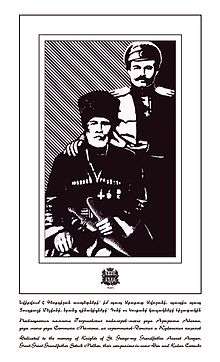Hayk Kotanjian
Hayk S. Kotanjian (Armenian: Հայկ Սարգսի Քոթանջյան, born in 1945 in Gyumri, Armenia) is an Armenian military diplomat, academic and political adviser. Since 2005, he has headed the Institute for National Strategic Studies (INSS) in Yerevan. He also chairs the Political Science Association of Armenia, and the Board of Conferment of Academic Degrees in Political Science and International Relations of the National Academy of Sciences.[1]

Kotanjian holds the military rank of Lieutenant General[2] of Armenian Armed Forces and diplomatic rank of Envoy Extraordinary and Minister Plenipotentiary. His academic qualifications include doctoral degree in Political Science & Security Studies from Russia's Academy of Public Administration (1992), PhD in Managerial Psychology from the Academy of Social Sciences (Moscow, 1981), and BA/MSc in Engineering Cybernetics from the Yerevan Polytechnic Institute, Armenia, as well as Diploma in Counter-terrorism from the US National Defense University (2004).[3][4][5]

In 1992, Kotanjian founded the Defense Policy Department of Armenia's Ministry of Defense (1992), and helped establish Armenia's defense attaché offices in foreign countries as part of diplomatic representations of Republic of Armenia abroad.[6] From 1998-2002, he held the position of Armenia's first Defense, Army, Air Force and Naval Attaché of the Republic of Armenia to the United States of America. During his tenure as attaché, he developed the blueprint of the first defense and security think tank in the Armenian defense system, the Institute for National Strategic Studies of the Armenian Ministry of Defense (INSS).[4]
In 1994, Kotanjian established and became the first editor-in-Chief of “Armenian Army” (Armenian: Հայկական Բանակ) — Armenian Army’s first academic journal with the focus on defense studies; in 2007, he founded “Working Notebooks” (Armenian: Աշխատանքային Տետրեր), Armenia’s first academic journal for strategic studies. In the 2000s, he directed Armenia's state program to develop the country's National Security Strategy, and is considered a key contributor to Armenia's military doctrine.[1]
Dr. Kotanjian has held several research positions in the field of national security studies and counter-terrorism in Western academic and defense institutions, including: Distinguished Visiting Faculty at the INSS, US National Defense University (2011); Visiting Scholar at the Harvard National Security Program (2010); and Counterterrorism Fellow, the US National Defense University (2003-2004).[3]
In recognition of Kotanjian's contribution to Armenia-US and Armenia-NATO defense cooperation, he received the Legion of Merit award from the US Government.[7] In 2008, he was nominated as Distinguished Graduate of the George C. Marshall European Center for Security Studies.[7] He is a founding member of the Marshall Center Alumni Association in Armenia. Kotanjian is a member of the Board of Academic Experts of the Collective Security Treaty Organization.[8]
Role in "Perestroika"
In 1986, after spending several years as Armenia's Minister of Vocational Education, Kotanjian became governor of Armenia's industrial province of Hrazdan.[9] In July and December 1987 he publicly clashed with the leadership of the Armenian Communist Party, accusing Armenia's Communist bosses of promoting corruption and favoritism, and sabotaging the Soviet leader Mikhail Gorbachev's policy of liberal reforms, known as Perestroika.[10] Kotanjian's pro-reform stance was welcomed in the USSR's intellectual liberal circles [11] and the pro-reform faction of the Communist Party in Moscow.[12][13]
| “ | … at the July 1987 plenum of the Central Committee of the Armenian party, the party organization was criticized for corruption and favoritism. The first secretary of the party district committee, Hayk Kotanjian, spoke of the growth of "a shadow economy," of falsification of reports, of bribery … [14] | ” |
References
- 1 2 Тер-Григорьянц Н. «Слово об авторе», Г. Котанджян «Политологические проблемы безопасности: Перестройка СССР - Карабах, Армения, Закавказье – Афганистан». Ер., ИНСИ МО РА, 2009. С. 282-285
- ↑ Decrees of the President of RA
- 1 2 Оганесян Н. Article: "Особая школа: Основоположник армянской военной политологии и политологии национальной безопасности." «Голос Армении» newspaper. 7-31-2010
- 1 2 Армянский биографический словарь "Кто есть кто". Volume 2. pp. 663-664
- ↑ Board of the Political Science Association of Armenia
- ↑ Annie Jafalian. Reassessing Security in the South Caucasus: Regional Conflicts and Transformation. Ashgate Publishing, Ltd., Nov 11, 2011. p. XIII
- 1 2 Dr. MG Hayk Kotanjian of Armenia named Marshal Center graduate|JUNE 13, 2008|«A1+» TV
- ↑ International Center for Electoral Systems
- ↑ Razmik Panossian. The Armenians: From Kings and Priests to Merchants and Commissars. Columbia University Press; First Edition (May 27, 2006), p. 378
- ↑ Karen Dawisha, Bruce Parrott. Conflict, Cleavage, and Change in Central Asia and the Caucasus. Cambridge University Press, 1997, p. 90
- ↑ Article: "Non-Entities And Personalities." By Dmitry Kazutin, Moscow News (newspaper). # 6, 1988
- ↑ "Gha-Ra-Bagh": The Emergence of the National Democratic Movement in Armenia. Wayne State University Press; First edition (September 1996), p. 88
- ↑ 100 Most Influential People of All Times (Mobi History). Reference 1986
- ↑ Ronald G. Suny. “LOOKING TOWARD ARARAT: ARMENIA IN MODERN HISTORY”. Indiana University Press (May 22, 1993), p. 197
Select publications
Kotanjian is the author of several monographs and numerous articles on crisis management, ethnic conflict, security, defense and strategic studies, and cyberpsychology.
- Грани согласия – конфликта. Цивилизационные проблемы теоретической и прикладной политологии. М., “Луч”, 1992
- Введение в этнополитологию консенсуса – конфликта. М., “Луч”, 1992
- Этнопoлитология консенсуса – конфликта. Цивилизационный аспект национальной безопасности. М., “Луч”, 1992
- Основы военной политики Республики Армения (военно-политический аспект национальной безопасности). Ер., 1992
- Politologische Probleme der Identifizierung und Regulung des bewaffneten Konflikts in Karabach: Der enige politich-rechtiche Aspekte des Berg-Karabach-Problems, (in German), Frankfurt am Main, 1999
- Основные направления разработки Стратегии национальной безопасности Армении в контексте архитектуры региональной безопасности. Ер., ИНСИ МО РА, 2008
- Политологические проблемы безопасности: перестройка СССР – Карабах, Армения, Закавказье – Афганистан. Ер., ИНСИ МОРА, 2009
- Этнополитология конфликта. Основы военной политики и национальной безопасности Армении. Ер., ИНСИ МО РА, 2010
- Հայկական Երկրաշարժ. Հայաստան, 1992